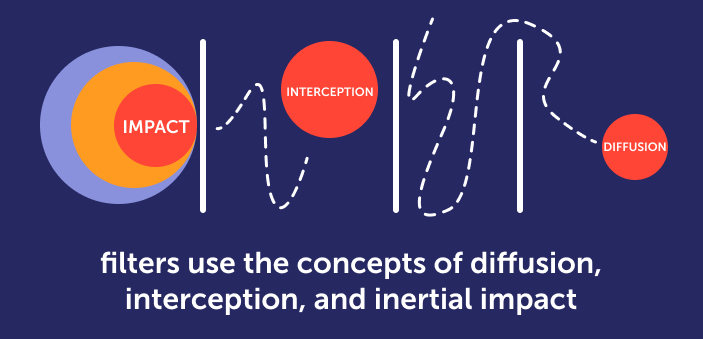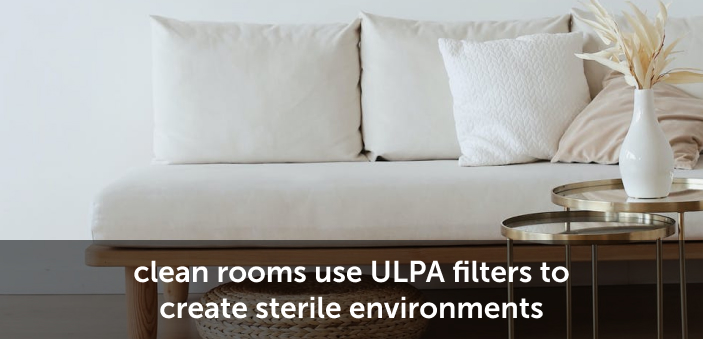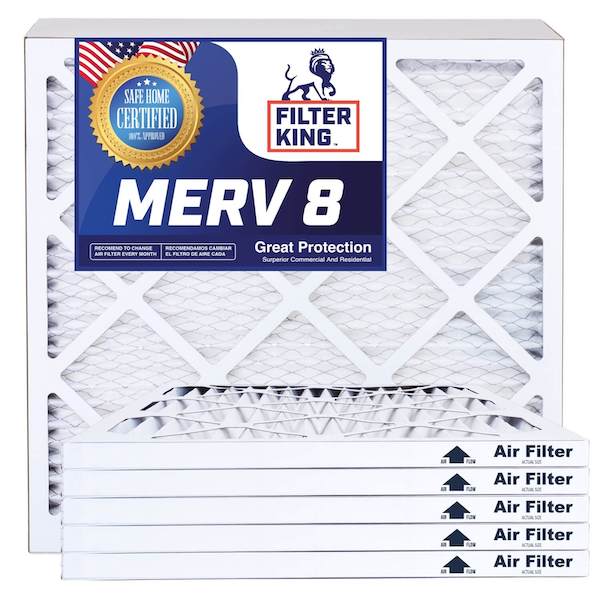ULPA vs. HEPA: Which one is better for me?
Most consumers aren’t aware of the acronyms HEPA and ULPA. Residential air filters are almost always HEPA filters, and for good reason. ULPA filters are almost always used for specialized environments, like clean rooms, also for good reason.
But before we dig into those reasons, we must explain what HEPA and ULPA filters are, and how they work.
HEPA stands for High-Efficiency Particulate Air. It’s a standard for filters, defined as being able to remove 99.99% of particles that are under 0.3 microns in diameter. This sounds absolutely incredible, right?
It is! But ULPA is technically better. ULPA stands for Ultra-Low Particulate Air. It’s defined as being 99.9995% effective in removing particles smaller than 0.12 microns in diameter. Now THAT’s filtration!
So, what’s the problem here? Shouldn’t we all just buy ULPA filters and get on with it?
Well, no. In fact, for residential purposes, ULPA filters will actually leave your air DIRTIER than a HEPA filter. What gives? Let’s find out.
How do HEPA filters work?

HEPA filters, and indeed most air filters, are composed of a dense, randomly assorted packaging of borosilicate glass fibers. Have you ever rubbed a balloon on your head and then felt your hair get stuck to it when you pull it away? Of course you have.
When air passes through a HEPA filter, the friction of the air passing through the borosilicate fibers charges them with static electricity.
This electricity interacts with contaminants in the air, which then stick to the fibers, leaving the air on the other side cleaner.
This is the exact same process behind your hair sticking to the balloon. Friction strips the electrons from your hair, making it positively charged. The balloon, now being negatively charged with the electrons, is then attracted by the laws of electricity to your hair.
Three mechanical processes assist the electrical process within HEPA filters: diffusion, interception, and inertial impaction.
Inertial impaction is the simplest mechanical force within your air filter. Most effective for the biggest particles, inertial impaction is just a fancy word for “a crash”. The larger particles are most likely, upon entering the filter material, to simply impact one of the fibers and stick to it.
Interception is similar, but is most effective for the medium-sized particles in your air. Air will draw mid-sized particles close enough for the static electricity between the particles and fibers to take over, drawing the particles into the fibers and making them stuck.
Diffusion is what helps to trap the tiniest particle. Diffusion is the natural movement of forced air around given obstacles. In HEPA filters, there’s a LOT of obstacles. These obstacles, the fibers, along with surrounding air, lead to Brownian motion of the contaminants in the air.
Brownian motion is, for the purposes of air filtration, totally random. This means that, once those tiny contaminants are in your air filter, they’re not going anywhere. The jostle about until they, too, stick to the borosilicate fibers.
This is the way HEPA filters work. And for the purposes of home air filtration, it’s perfect. You can even order HEPA filters of different qualities to customize your air quality vs. price balance.
MERV, or Minimum Efficiency Reporting Value, is a figure used in filters to denote how effective the filter is. Filter King offers a wide range of MERVs in any size, from standard MERV 8s to premium MERV 13s!
What is the difference between ULPA and HEPA?

The only material difference between a HEPA and ULPA filter is the density of the borosilicate fibers. In an ULPA filter, the fibers are packed far more densely than in HEPA filters.
While this may sound like ULPA filters are better than HEPA filters, the case is actually the opposite for residential use.
To explore this, we have to define a concept called ACH.
ACH, or air cycles per hour, represents the number of times a given volume of air cycles through a filtration system every hour.
Residential air systems are only equipped to run with a certain amount of power. When a HEPA filter is placed within that system, that power can be maintained.
An ULPA filter, on the other hand, is too dense, and restricts the air flow. This not only places a large strain on the components of your HVAC system, and increases your electric bill, but it also decreases the number of air cycles per hour in your home.
That’s right - using an ULPA filter in your home will actually reduce the quality of the air in your home. An ULPA filter is great, but it won’t allow as much air to cycle, and therefore won’t clean the air as many times. A HEPA filter, by contrast, will allow air to cycle much more quickly, leaving your air cleaner than an ULPA filter will.
So what is the purpose of an ULPA filter?
ULPA filters are used for highly specialized environments where the air needs to be as completely pure as possible.
Clean rooms are one example. Particularly common in electronics factories, clean rooms are used for creating highly sensitive components that have very little tolerances for dirt or dust.
Your smartphone, for example, has many components which were assembled in a clean room.
The engine of the Nissan GTR, a high-performance Japanese sports car, is famously assembled in a clean room (or, as it were, an entire clean factory). The workers in this factory are required to wear sterilized, disposable suits and boots when working on the engine, all in the name of keeping dust out of the newly constructed parts. The result is an engine so reliable that Consumer Reports cannot realistically get data on any problems they have.
ULPA filters are extremely effective. But the systems that use them are specialized, and considerably more powerful than a residential air filter system.
How can I get a HEPA filter?

Filter King’s online store has HEPA filters of several different MERVs, and in virtually any size you can imagine.
Check it out, find your size, and get your filter delivered quick and easy. You can even set up a subscription to have new filters automatically delivered when they’re needed.
Find out why they call us the King!
 14x14x1
14x14x1